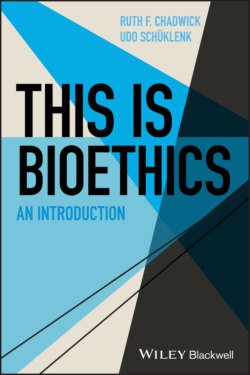Читать книгу This Is Bioethics - Udo Schüklenk, Ruth F. Chadwick - Страница 7
PREFACE AND ACKNOWLEDGMENTS
ОглавлениеJeff Dean, our then Commissioning Editor at Wiley‐Blackwell, suggested to one of us in 2014 to produce a bioethics introductory text. It’s always easier to agree to do a thing, then to actually do it, and so it took a ‘mere’ six years – on and off – to write this volume for you. Marissa Koors, Jeff Dean’s successor at Wiley, and Steven D. Hales, our long‐suffering series editor for the This is Philosophy series at Wiley‐Blackwell, showed an unusual degree of patience with us, our book, and our seemingly never‐ending delays. There is a German saying along the lines that a good thing takes time. You be the judge on This is Bioethics. Last but by no means least, we owe a great deal of gratitude to Nivetha Udayakumar, this book’s Production Editor, for a job very well done.
Both of us have spent our academic careers in the field of bioethics, we jointly have been Editors of Bioethics, arguably the top philosophical bioethics journal, for more than two decades. Still, as we discovered, it’s one thing to successfully author and publish peer reviewed research content, and it’s quite another to write content specifically for introductory, and for teaching purposes. We deliberately did not review other bioethics textbooks to decide on what to include or not to include as far as the book’s content is concerned. This book reflects what we think a student of bioethics, who takes an introductory course, should – at a minimum – have read and thought about. Quite deliberately we kept the tone informal, aiming to strike a conversational tone. We also quite deliberately avoided technical jargon where that was possible. Some of the external reviewers of an earlier draft of this manuscript had mixed feelings about this. We hope it works for you!
How should you go about reading this book? For one thing, we included plenty of links to sites that we hope won’t have disappeared by the time you read this. Check them out if a particular issue catches your interest, and you want to know more. Definitely read Chapters 1–4, in that order, the other chapters can mostly be read independently of each other, even though we have taken care to cross‐reference relevant content in other chapters where that was appropriate. We have also added guiding questions at the end of each chapter. We strongly recommend that you take a moment to reflect on these questions. Thinking about defensible answers will assist you in using the concepts and arguments you read about, and so you will gain a better understanding of them and their respective strengths and weaknesses. If you choose to do so, you would likely find yourself in a better position to defend your views on any number of current‐day contentious issues, based on sound ethical analysis.
For any bioethics book you hopefully will – you should! – wonder where the authors ‘are coming from’, what their prior ethical commitments are, and to what extent those commitments influence the content you are reading. Scholars with religious commitments are likely to produce content and arguments that differ from those who are atheists, philosophical utilitarians will differ in their writings from philosophical deontologists, and so on and so forth. We were cognisant of this issue and tried to give views a fair shake, as it were, that we disagree with. We also included references to further reading written by authors whose views we do not necessarily share. Make use of that information, reflect on the arguments given, and form your own considered views.
Ruth F. Chadwick
Udo Schüklenk
